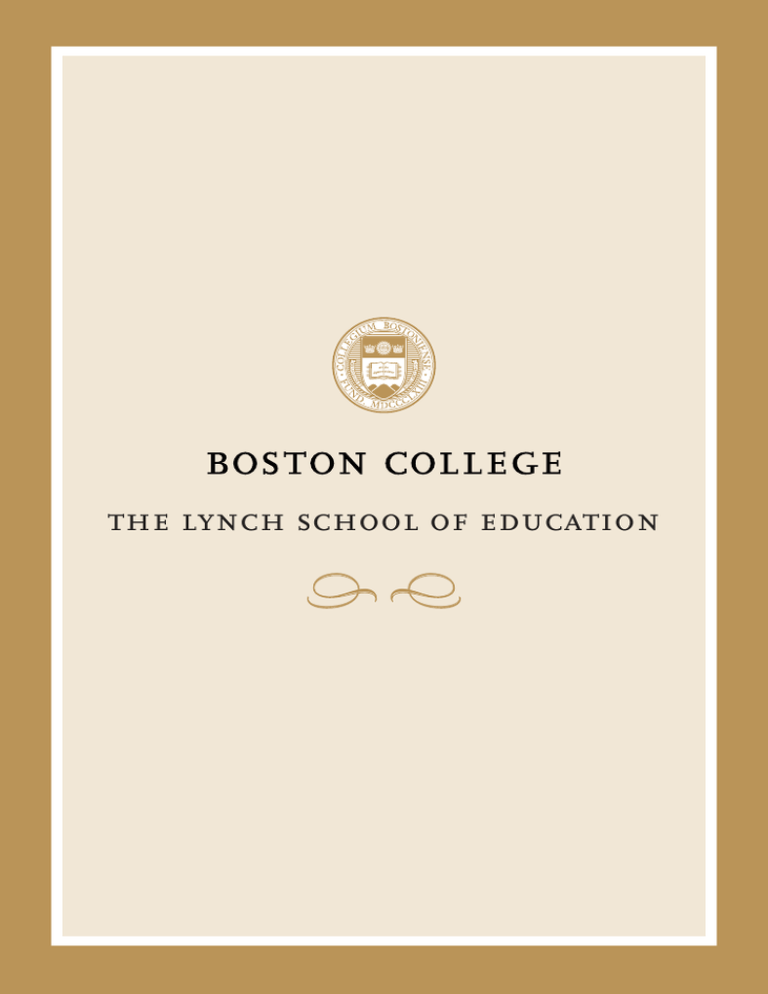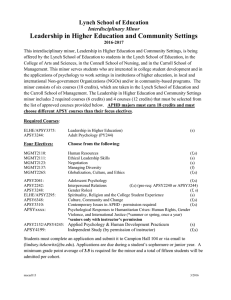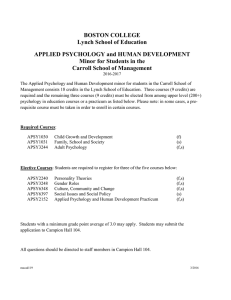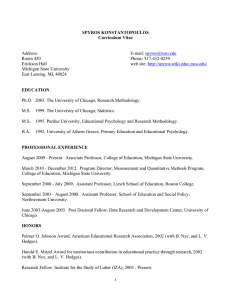2 the lynch school of education
advertisement

the lynch school of education 22 The Carolyn A. and Peter S. Lynch School of Education is pleased to announce the appointment of three new faculty members. Their strengths as teachers and scholars support our goal of putting knowledge to work for the common good. Rev. Joseph M. O’Keefe, S.J., Dean 2 Spyros Konstantopoulos joins the Lynch School in the fall of 2008 as assistant professor in the Department of Educational Research, Measurement, and Evaluation (ERME). He comes to Boston College from Northwestern University, where he served as a tenure-track assistant professor in the School of Education and Social Policy from 2003 to 2008. With a Ph.D. in research methods from “I chose BC because the Lynch School of Education is one of the top schools of education and the ERME Department is one of the strongest departments of quantitative methods in the nation.” — spyros konstantopoulos the University of Chicago, Konstantopoulos is interested in the extension and application of statistical methods to issues in education, social science, and policy studies. His work encompasses research on the effects of educational interventions such as class size, school and teacher effects, and the social distribution of academic achievement. He is now researching the persistence of teacher effects in elementary school grades. The National Institutes of Health, the National Science Foundation, and the Searle Foundation have awarded Konstantopoulos more than $6 million in grants for research on leadership in middle school math, the impact of online professional development, and preparing youth for responsible adulthood. In 2002, Konstantopoulos received the American Educational Research Association’s Palmer O. Johnson Award and the Harold E. Mitzel Award for meritorious contribution in educational practice through research. He serves on the editorial boards of Sociology of Education and Research Synthesis Methods. 2 Elida Laski joins the Department of Counseling, Developmental, and Educational Psychology as assistant professor in January 2009 from Carnegie Mellon University where she is completing her Ph.D. in developmental psychology within the IES-funded Program in Interdisciplinary Educational Research. Her research focuses on the development of numerical knowledge in young children. Most “The Lynch School is unique in their commitment to furthering both theory and practice related to education, as well as their commitment to collaborations with urban schools and teachers. I envision many productive collaborations.” — elida laski recently, she is investigating how subtle differences in the design and procedures of board games influence kindergartners’ acquisition of numerical knowledge. Prior to her doctoral studies, she obtained a Master’s in early childhood education and worked in public schools for five years. Among her accomplishments, Laski has contributed to the MacMillan– McGraw Hill preschool mathematics curriculum and has instructed courses on cognitive development and teaching strategies for early childhood. Laski has also coauthored a six-session curriculum that can be implemented in Head Start centers and family support centers to help families and children in the transition to kindergarten. She is currently working with the Office of Child Development at the University of Pittsburgh to develop a research plan for evaluating the efficacy of the curriculum. She is a member of the European Association for Research in Learning and Instruction, the Society for Research in Child Development, and the Cognitive Development Society. 2 Paul Poteat joins the Department of Counseling, Developmental, and Educational Psychology in the fall of 2008 as assistant professor of counseling psychology. Poteat comes to the Lynch School from the University of Illinois at Urbana-Champaign where he completed his Ph.D. in counseling psychology and taught courses on social intergroup and intragroup identities and dialogues. “I feel privileged to join Boston College and contribute to such a strong program. I look forward to partnering with schools and building long-term connections to address social issues such as bullying and prejudice, while also promoting the healthy psychological and social development of all students.” — paul poteat His work examines how peer group social networks account for and influence the prejudiced attitudes and behaviors of individuals from adolescence to young adulthood. This includes identifying peer similarities and group norms around homophobic and racist attitudes and behaviors, and how peers socialize these attitudes and behaviors over time. He is now analyzing data to examine the developmental trajectories of prejudiced attitudes during adolescence and to identify individual factors and group processes that predict how attitudes develop and change over time. He serves on the Journal of LGBT Youth editorial board and was awarded the Barbara A. Kirk Award for Outstanding Graduate Student Research by the American Psychological Association and the Outstanding Graduate Student Award by the Council of Counseling Psychology Training Programs in 2008. boston college the lynch school of education 140 Commonwealth Avenue Chestnut Hill, Massachusetts 02467


